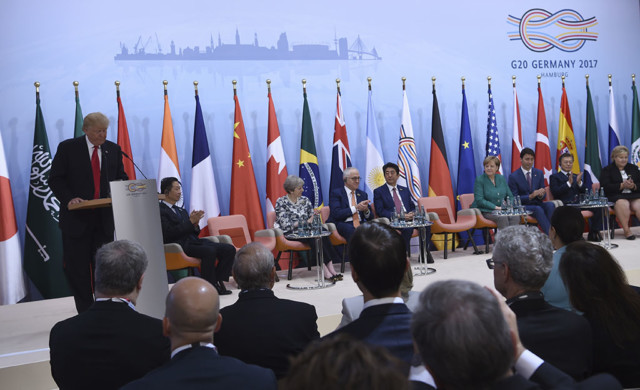The time for talk has ended as leaders of the world’s largest economies return home ready to act on global priorities.
The G-20 Summit ended with a compromise on trade and deadlock on climate change that left one leader out in the cold. It was a test of international determination and, at times, discord.
CGTN’s Guy Henderson provides a wrap-up of the two-day meeting of global leaders.
For most of the 100,000 gathered in the streets of Hamburg, Germany, it was a chance to chant: “not in our name.” For a handful of others, three days of expressing opposition for the G-20, wasn’t enough. German police have been praised for their handling of the violence – the collateral damage was kept to a minimum.
The protesters made their point – and now, Hamburg’s residents are doing so, determined to clean up what many had predicted. A lot of them simply headed out of town for the weekend: because even in the calm of daytime, much of the center was on lockdown.
That’s what happens when this many world leaders are in one place at the same time. For what proved to be a new level of discord inside as well. After day one: deadlock on trade and climate change. Then a breakthrough of sorts – the United States agreed to back open markets.
Subsidized Chinese steel exports continue to frustrate Washington and Europe – so a timeline’s been set to work those differences out. If that doesn’t happen – it could yet spark a trade war. That’s something the leaders of China and the U.S. appear to want to avoid.
But, no such leeway on climate change. The United States was singled out for its differing stance in its very own section of the final G-20 communique. Turkey spoke of other potential waverers on climate change and even threatened not to ratify the deal without financial concessions.
 CGTN America
CGTN America US President Donald Trump speaks during the panel discussion “Launch Event Women’s Entrepreneur Finance Initiative” on the second day of the G-20 summit in Hamburg, Germany, Saturday, July 8, 2017. (Patrik Stollarz/Pool Photo via AP)
US President Donald Trump speaks during the panel discussion “Launch Event Women’s Entrepreneur Finance Initiative” on the second day of the G-20 summit in Hamburg, Germany, Saturday, July 8, 2017. (Patrik Stollarz/Pool Photo via AP)
